
Great Canadian Shoreline Cleanup: students help restore Toronto beaches
Published: September 19, 2014
Almost 100 University of Toronto students have promised to give up the possibility of a lazy Sunday lying on the couch – or studying – for a day of cleaning litter from Toronto beaches.
They will be joining thousands of Canadians in what is recognized as one of the largest direct action conservation programs: the Great Canadian Shoreline Cleanup.
“Students at U of T are passionate about their community,” says Kristina Minnella of The Centre for Community Partnerships (CCP) at U of T. “The Shoreline Cleanup is a way for students to share their passion for the environment and actively showcase their leadership skills, while also engaging in a community activity.”
Launched in 1994 by a small team of employees and volunteers at the Vancouver Aquarium, the grassroots program seeks to promote an understanding and awareness of shoreline litter issues by encouraging Canadians to take part in cleaning and rehabilitating the shores in their communities. Over the years, it has turned into a national program, supported by tens of thousands of volunteers across the country.
The CCP organized the first U of T Shoreline Cleanup in 2009, says Minnella, the CCP’s coordinator, co-curricular service-learning and student development. So far, 155 U of T students have taken part in this initiative, with 75 students attending last year alone.
Coco Lee, a student of French, Spanish and linguistics, participated in the event last year and is volunteering again this year.
“I love that small sections of U of T, groups that may not otherwise have mingled, come together to participate,” says Lee. “And it facilitates an empowering sense of stewardship in the community.”
A don at U of T’s Victoria University, Lee says she is always looking for initiatives to help students from her house grow as individuals and contribute to the community.
“Whether they are in student leader roles or not,” says Lee, “the cleanup is an easy way to spend an afternoon and invest a little in the world around you.”
This is CCP’s first community day event of the year and the group of student volunteers so far is very diverse, according to Minnella. “We have students from their first year to grad school signed up from different colleges, faculties and departments.”
Kaylah Krajnc, a student of biodiversity and conservation biology, psychology, environment and science, chose to work on this project while interning at CCP this past summer. She is impressed that so many students have registered to volunteer.
“I’m very passionate about environmental sustainability and I love to help others understand the importance of maintaining healthy ecosystems,” says Krajnc. “The number of people who care about environmental sustainability makes me feel even more connected to students at the University of Toronto.”
And that makes Minnella very happy. “This is a great opportunity for students to make a new friend, while taking an active role in the Toronto community,” she said. “I hope that students will feel a sense of community both as a member of the U of T community, as well as the Toronto community.”
Interested in spending one last day at the beach? It’s not too late to get involved: http://uoft.me/shoreline2014
(Read more about U of T students volunteering in the community.)



